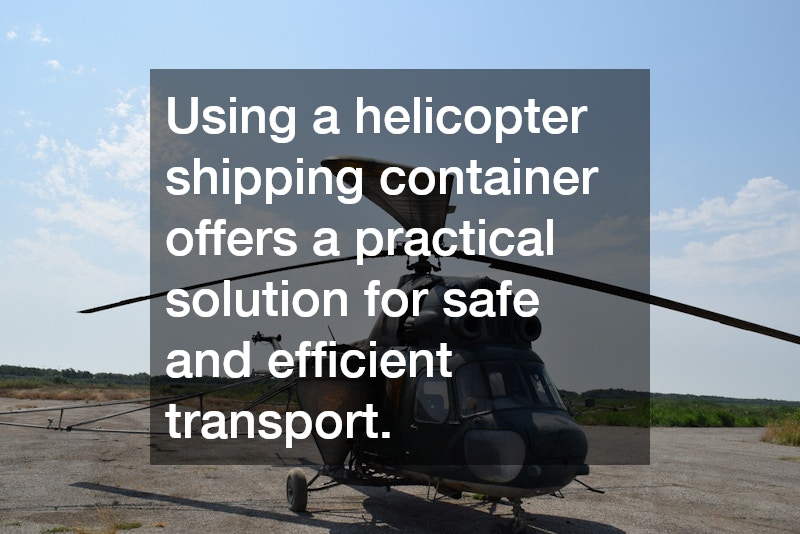Transporting helicopters across regions or countries requires precision, expertise, and compliance with strict legal frameworks. Using a helicopter shipping container offers a practical solution for safe and efficient transport, but it also introduces various legal considerations. From ensuring regulatory compliance to managing liability, understanding these factors is crucial for a smooth shipping process.
Compliance With International Shipping Regulations
Adhering to Aviation Standards
Helicopters are specialized equipment, and their shipping containers must meet international aviation standards. These standards often specify container dimensions, material strength, and secure mounting mechanisms to ensure safe transport. For instance, the International Air Transport Association (IATA) and the International Civil Aviation Organization (ICAO) provide guidelines for packaging and securing aviation equipment.
Customs and Import/Export Regulations
Shipping helicopters internationally requires compliance with customs laws in both the origin and destination countries. Each country has its own rules regarding the import and export of aircraft, and failure to comply can lead to delays, fines, or confiscation of the shipment. A thorough review of customs documentation, including bills of lading, invoices, and certificates of origin, is essential.
Contractual Agreements for Shipping
Defining Responsibilities
When using a helicopter shipping container, it’s important to establish clear contractual agreements with the shipping provider. The contract should outline the responsibilities of each party, including who is liable for packing, securing, and inspecting the container before shipment.
Liability Clauses
Helicopter transportation involves significant financial investment, making liability clauses a critical part of any contract. Specify who is responsible for damages caused during transit, whether due to mishandling, environmental factors, or container failure. Many contracts also include force majeure clauses to address unforeseeable circumstances like natural disasters or political unrest.
Insurance Coverage for Helicopter Shipping
Comprehensive Coverage
Given the high value of helicopters, obtaining robust insurance coverage is non-negotiable. The insurance policy should cover potential risks such as damage during loading or unloading, accidents in transit, and container failure. It’s important to choose a policy that specifically includes coverage for the helicopter shipping container itself, as well as the helicopter.
Legal Review of Insurance Policies
Before shipping, have the insurance policy reviewed by a legal expert to ensure it adequately protects your interests. Look for exclusions or limitations in coverage, such as those related to specific routes, weather conditions, or the age of the helicopter.
Safety Standards and Certifications
Ensuring Container Certification
Helicopter shipping containers must be certified to meet safety and quality standards. Certifications such as ISO 1496 (for freight containers) and aviation-specific standards demonstrate that the container has been tested and approved for use in helicopter transport. Using uncertified containers can lead to legal disputes if damage occurs during transit.
Compliance With Hazardous Materials Laws
Some helicopters may require shipping with attached fuel tanks or batteries, which are classified as hazardous materials. In these cases, the shipping process must comply with hazardous materials regulations, such as those outlined by the International Maritime Dangerous Goods (IMDG) Code or the U.S. Department of Transportation (DOT).
Intellectual Property Protection
Protecting Helicopter Designs
Helicopters often incorporate proprietary technologies or designs, making intellectual property (IP) protection a key consideration. When shipping, ensure that proper confidentiality agreements are in place with shipping providers and customs officials to protect sensitive information.
Container Design Patents
If you are using a custom-designed helicopter shipping container, verify whether the design is patented or protected by intellectual property laws. This prevents unauthorized replication or misuse of the container’s design by third parties.
Environmental and Noise Regulations
Emissions Standards
Shipping helicopters, particularly over long distances, may involve compliance with emissions regulations. For instance, the transportation method (e.g., sea freight or air freight) must meet environmental standards set by international organizations or local governments.
Noise Abatement Rules
Helicopters are subject to noise regulations, even when being transported. Some regions impose restrictions on the movement of noisy cargo, requiring proper documentation to demonstrate compliance with local noise abatement laws.
Dispute Resolution and Legal Recourse
Jurisdiction and Governing Law
Shipping agreements often specify the jurisdiction and governing law in case of disputes. This is especially important when shipping internationally, as laws can vary significantly between countries. Make sure the agreement includes a clear dispute resolution clause to avoid jurisdictional conflicts.
Mediation and Arbitration
Many shipping contracts include mediation or arbitration clauses as alternatives to litigation. These methods can help resolve disputes more quickly and cost-effectively. Before signing a contract, consult a legal expert to ensure these clauses align with your interests.
Best Practices for Legal Compliance
Engage Legal Counsel
Working with a legal professional experienced in shipping and aviation law can help you navigate the complexities of transporting helicopters in specialized containers. Legal counsel can assist with reviewing contracts, ensuring compliance with regulations, and protecting your rights in case of disputes.
Maintain Accurate Documentation
Proper documentation is crucial to avoid legal issues during shipping. Maintain detailed records of the helicopter’s condition before shipment, the container’s certification, and any agreements with third parties. These records can be invaluable if disputes or claims arise.
Partner With Reputable Providers
Choosing a reliable shipping provider with experience in handling helicopters can mitigate legal risks. Look for companies with strong safety records, compliance certifications, and transparent policies.
Shipping a helicopter in a helicopter shipping container involves much more than logistics. Legal considerations such as regulatory compliance, contractual agreements, insurance, and intellectual property protection are critical to ensuring a smooth process. By addressing these factors and working with experienced professionals, you can minimize risks, protect your investment, and successfully transport your helicopter to its destination.
Taking the time to understand these legal considerations not only safeguards your assets but also ensures peace of mind during the shipping process.
.




